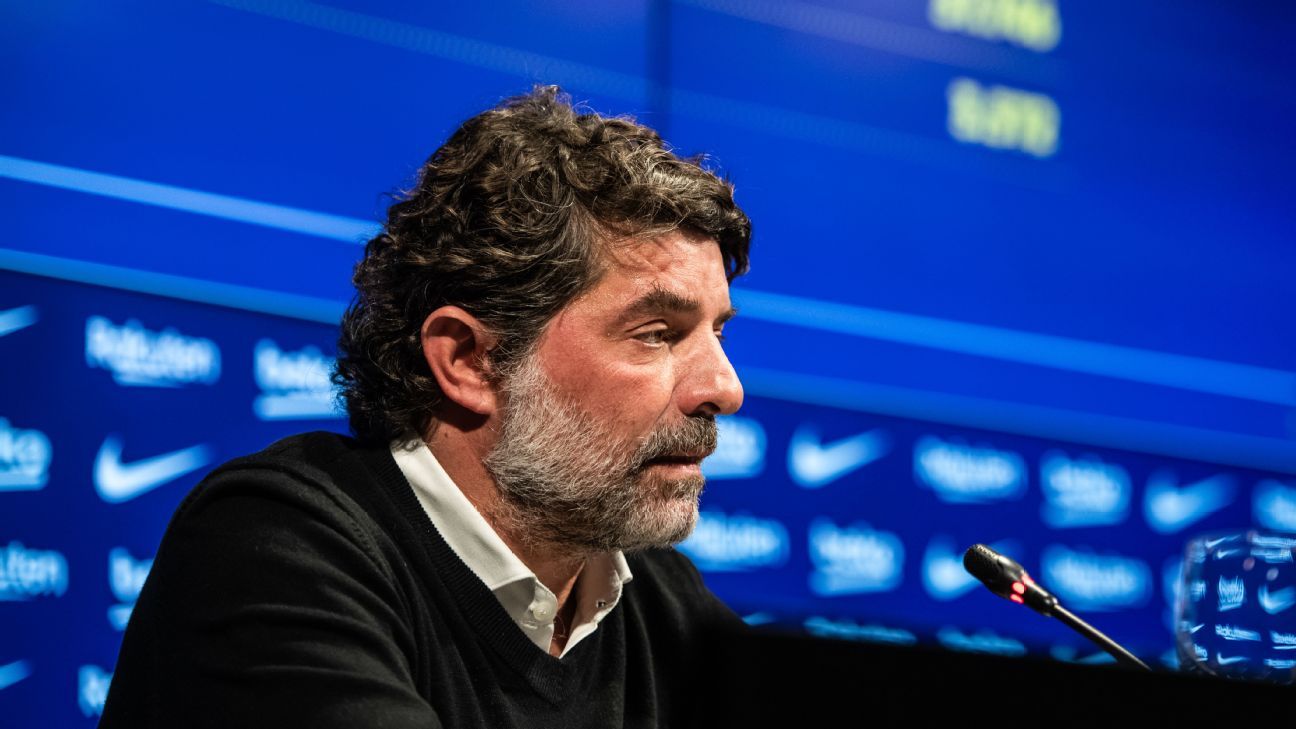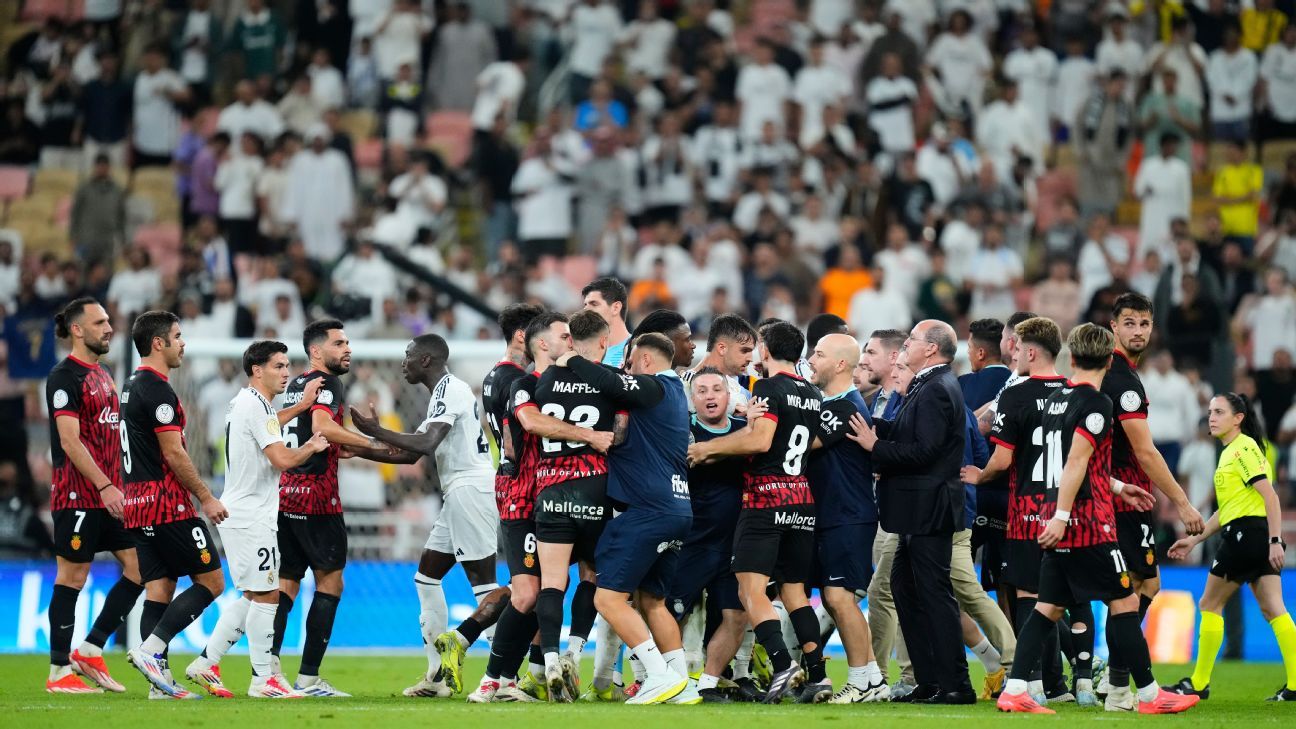
Dale Johnson, General Editor, ESPN FCJul 24, 2024, 09:53 PM
It was the very first game of the 2024 men's Olympic tournament, with much-fancied Argentina taking on Morocco in Saint-Étienne.
Goals either side of half-time from Soufiane Rahimi had put the north Africans up 2-0, before Giuliano Simeone pulled a goal back on 68 minutes.
As the game reached the 90th minute, fourth official Frida Klarlund indicated there would be a mammoth 15 minutes added on. This was a return to what we've seen in previous FIFA-sanctioned competitions -- lengthy stoppage time -- after Euro 2024 had seen only small amounts added on.
According to Opta, the total length of the match was 110 minutes and 29 seconds, but the ball was in play for only 54 minutes and 27 seconds: the average at Euro 2024 was almost 60 minutes. The second half saw 26 minutes and 5 seconds of effective playing time, despite the clock reaching 65 minutes.
Would there be time for Argentina to force an equaliser?
Argentina U23 vs. Morocco U23
What happened: The 15 minutes of stoppage time were up, and the game had ticked into the 16th when Thiago Almada saw his shot from the edge of the area saved by Munir El Kajoui.
But the move wasn't over. El Kajoui spilled the ball back out into the centre of goal, with Nicolás Otamendi seeing his follow-up effort expertly touched onto the bar by the fine reactions of the goalkeeper.
The ball bounced down and fell for substitute Bruno Amione on the edge of the 6-yard box, who attempted to head back across goal into the far corner. His effort came back off the bar and landed onto the head of Cristian Medina, who had the simple task of nodding into an empty net.
Argentina had done it. It was 2-2 in the 106th minute of the game.
Morocco's fans were furious that Argentina had been allowed to score after time had supposedly elapsed. There were images of some Argentina players flinching when what appeared to be a flare was thrown in their direction. Bottles and cups were strewn over the field by the end as Morocco fans invaded the pitch.
Swedish referee Glenn Nyberg took both sets of players off the pitch, and a message on the big screen in the stadium read: "Your session has been suspended please make your way to the nearest exit."
Everyone assumed the game was over. Scores pages displayed full-time. But it wasn't, and soon the Olympics website showed the match as "interrupted." And while this was happening the VAR, Paolo Valeri of Italy, was of course carrying out his usual checks on a goal.
VAR decision: Goal disallowed, offside against Amione.
VAR review: Play had been stopped for an hour and a half when news came through that Argentina's dramatic equaliser had been ruled out for offside. Against which player? At that stage, we didn't know.
Such is the nature of the Olympic football tournament -- eight games are played in eight cities across the host country in just eight hours -- that it's difficult to get detailed information, even more so when a stadium has been cleared to prevent any further crowd disturbances, meaning there are no public announcements.
While the perception will be that it had taken the VAR at least 90 minutes to disallow the goal, it would have been ruled out almost instantly in the course of a routine check through FIFA's semi-automated offside technology.
As Medina's "goal" caused such problems among supporters inside Stade Geoffroy-Guichard, making an immediate decision to disallow it could potentially have caused further crowd issues. The organisers may have felt it was safer to wait until the ground was cleared before announcing the goal had been disallowed through VAR, and that the game would restart behind closed doors -- even if it came across as confusing and was seen as one of VAR's wildest moments.
When Otamendi hit his shot, Amione was in front of the last defender. That the keeper got a touch and the ball came back off the bar doesn't reset the offside phase -- Amione remains active and he plays the ball as he's offside, and the goal had to be chalked off.
The players came back out onto the pitch to warm up just before 7 p.m. local time.
Almost two hours after the game had been "interrupted," Nyberg officially disallowed the goal for a VAR intervention. In a surprising move, he went through the unnecessary ceremonial process of visiting the pitchside monitor, which he wouldn't have done for an offside during the game, and then made the TV signal to the empty ground.
Play restarted with a free kick to Morocco in their own penalty area. The game was completed around 7:10 p.m. as Morocco saw out the final moments to win 2-1.
(Editor's Note: FIFA has been asked for comment regarding the delay in VAR disallowing the goal, but they did not respond by the time of publication. We will update with more information should it become available.)
1:10
Morocco beat Argentina amid fan invasion chaos
Pitch invaders forced the first football match of the Olympics between Argentina and Morocco to be delayed by more than an hour.
For those unfamiliar, what is VAR exactly?
VAR stands for "video assistant referee," a technology used to help referees review in-game events to make accurate decisions during a match.
The VAR team, generally comprised of a VAR official, three assistant VARs and a video replay operator, will notify the referee if they deem that a clear and obvious error has been made and a decision should be changed. The referee can either change the call made on the field based on a VAR recommendation or stick with the original decision after reviewing footage of the incident on a nearby monitor.
Ultimately, the referee makes the final decision.
VAR reviews can happen in four situations:
1. Goals: Confirming whether there was an infringement on a goal, which involves checking for offside or a foul.
2. Penalties: Confirming whether there was a penalty by reviewing the challenge, whether contact inside the box or if simulation took place. If a penalty is saved, or a goal scored from the rebound, the VAR will check for any offences.
3. Direct red cards: Reviewing if a foul was serious enough to warrant ejecting a player.
4. Mistaken identity: Ensuring the referee has sanctioned the correct player with a red or yellow card.
 (1).png)
 5 months ago
27
5 months ago
27


















